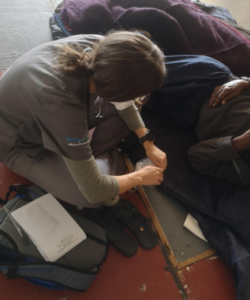This post is the third in a series featuring case studies of mobilisation from the 2020 Support. Don’t Punish Global Day of Action. We’re grateful to SANPUD for clearly illustrating the power of community mobilisation. On 26 June 2021, join us in this international show of force for sustainable alternatives to punitive drug policies. Support. Don’t Punish!
In November 2019, SANPUD was awarded a grant as part of the campaign’s Initiatives Programme. The initial work-plan hinged on harm reduction trainings and a fascinating PhotoVoice project, with the goal of bringing to the fore personal stories narrated in the first person through the art of photography.
When the COVID-19 pandemic hit, however, SANPUD nimbly adapted their response to prioritise the most pressing needs of peers made particularly vulnerable by intersecting forms of oppression.
Not housed, but warehoused: Responding to the emergency precipitated by forced relocations

Source: SANPUD
In response to the pandemic in Cape Town, the government authorities decided to relocate, often forcibly, the city’s street-based population. Movement restrictions were imposed and enforced, impeding people from leaving makeshift camps. While opioid agonist therapy (OAT/OST) take-home doses are available in the city through the Step-Up Project, the programme’s reach remains highly limited. As a result, dozens of street-based people living with opioid dependence found themselves coralled in a foreign environment, without access to their regular channels of supply.
SANPUD quickly responded with a dual strategy. On one hand, reaching out to stakeholders to try to secure a safe supply of OAT and naloxone for the people in the city’s Strandfontein camp. And, on the other hand, mobilising the necessary resources to ensure symptomatic medication to alleviate the suffering associated with opioid withdrawal. Acknowledging the gravity of the situation, and with the support of the Elton John AIDS Foundation, some of the Initiatives Programme funds were quickly reprogrammed to secure much-needed medication. SANPUD collaborated with a specialist doctor to assist community members in the camp, some of whom had to be transported by ambulance services to the hospital for further care, given their dire state of health.
‘Arriving on site to happy “Hi sister!” calls from residents who know that help has arrived was an uplifting experience’, said MJ Stowe, Project Manager at SANPUD. While the levels of need exceeded SANPUD’s capacity for support, they also assisted people who were critically ill and of an advanced age. Yet another expression of the spirit of solidarity in community responses, in the near total absence of anything similar from official authorities. Besides providing much-needed immediate relief to peers in need, this activity allowed SANPUD to show the power of grassroots mobilisation under the campaign, both to fellow community members and city authorities. SANPUD has, since, continued to grow in strength, their work acknowledged by city and national authorities. Indeed, in a regional first, the network was officially launched by the South African Deputy Minister for Social Development in October 2020.
“Seeing people recover from withdrawal being able to eat and walk again filled us with joy. Once recovered, many provided assistance to others who were only beginning to experience withdrawal.” MJ Stowe, Project Manager (SANPUD)
Knowledge is empowerment: Capacity-development training
In line with SANPUD’s belief that community members should have agency over their well-being, the network organised a series of learning resources to share harm reduction information. These included: A webinar on the existing provision of harm reduction services in South Africa, how they had been impacted by the COVID-19 pandemic and responses to it, and the impacts on street-based people. And peer-led naloxone administration and overdose-prevention training sessions (in May and June), which included the provision of prescribed naloxone as well as information on how to obtain it through healthcare professionals.
The power of story-telling: PhotoVoice project
The third pillar of SANPUD’s Initiative Programme was the PhotoVoice project. SANPUD collaborated with South Africa’s only ‘housing-first’ residence, which opened its doors on 1 June 2020, to reach out to people who use and/or have used drugs and invite them to use photography to illustrate how their drug use had impacted their lives, positively or negatively. On 26 June 2020, for the campaign’s Global Day of Action, StreetScapes and SANPUD hosted an exhibition of the photographs. Campaign goodies were distributed and the project’s participants were able to share their stories with peers and attendees. SANPUD’s MJ Stowe said the space was an opportunity to make visible the complexity of the lived experiences of people who use drugs. In a country where drug policies are anchored both in prohibitionist laws and the legacy of apartheid and racism, the PhotoVoice project offered an antidote to harmful caricatures, instead placing real, individual, nuanced, experiences at the centre. SANPUD and StreetScapes expect to recreate the exhibition in new spaces once the emergency of the pandemic subsides.
[ON AIR] The South African Network of people who use drugs is fighting the scourge of drug abuse through its photovoice and story-telling concept. MJ Stowe talks to @UvekaR about this. #Addicts #Drugs #eNCA Courtesy #DStv403 pic.twitter.com/XZILV2q3Kl
— eNCA (@eNCA) June 16, 2020